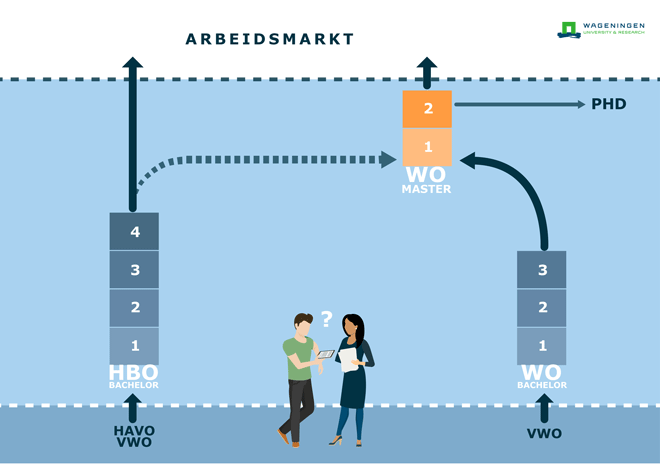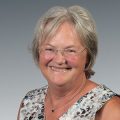What is a Bachelor’s programme ?
If you attend an open day with your child, you will probably hear people repeatedly mention Bachelor’s programmes. This is a relatively new term in the Netherlands. What is a Bachelor’s programme? (In Dutch)

Higher vocational training programme (hbo), university programme
In the Netherlands, we used to have higher vocational training programmes (hbo, University of Applied Sciences) and Research University programmes. It goes without saying that both types of education are still available, but they now take the form of a Bachelor’s programme. This can be followed by a Master’s programme. What is a Bachelor’s course ? Similarities and differences. Choose a degree programme togetter.

After following a Bachelor’s programme on hbo level (University of Applied Sciences) you are prepare for the labour market. After following a Research University programme you should do a Master’s programme after your bachelor’s course.
What is a Bachelor’s programme in higher vocational education (hbo, University for Applied Sciences)?
What used to be called a higher vocational (hbo, University of Applied Sciences) programme is now called a Bachelor’s course, sometimes also referred to as ‘bachelor of profession’. This Bachelor’s programme trains students to become highly educated professionals, and prepares them for a specific profession. Students are taught a lot of difficult theory, but this theory focuses mostly on their future professional career. The programme includes a lot of internships and assignments that prepare students for the labour market. The goal of this Bachelor’s programme is the same as that of the old hbo programmes: train students to become highly educated professionals. This is why the universities that offer these programmes often call themselves ‘university of applied sciences’. As the name indicates, their focus lies on applied science and knowledge. Knowledge that is geared towards the labour market. A Bachelor’s programme from a University of Applied Sciences takes four years to complete. Students are required to complete 60 credits per year. There are many similarities as well as differences between this type of Bachelor’s programme and a Bachelor’s programme from a Research University.
What is a Bachelor’s programme from a Research University?
Research Universities also offer Bachelor’s programmes, which can be confusing at times. It used to be that university programmes took four to five years to complete. Nowadays, university programmes are split into two parts: a Bachelor’s programme and a Master’s programme. The first part of a university programme is therefore also called a Bachelor’s programme, just as in higher vocational education (hbo, University of Applied Sciences). In terms of content, however, these programmes are quite different. A Bachelor’s programme from a Research University focuses mostly on theory. Students are in principle trained to become researchers and scientists. There is little practical learning involved. And the knowledge offered is broad and general, not aimed at a specific profession. A Bachelor’s programme from a Research University takes three years to complete. Students are required to complete 60 credits per year.
After a Research University Bachelor’s programme comes a Master’s programme
During a Bachelor’s programme from a Research University students learn many things, but they don’t necessarily learn to apply this knowledge in practice. The practice is something students learn in a Master’s programme. A full-fledged university education therefore includes a Bachelor’s and a Master’s programme. You really cannot say that someone has completed their university education if they stop after their Bachelor’s programme. After completing their Bachelor’s programme, students can enrol in a Master’s programme. The duration of a Master’s programme depends on the topic. Master’s programmes in science, including physics, chemistry, biology and mathematics typically take two years to complete. Other Master’s programmes usually take one year to complete. But Master’s programmes in medicine take three years. As part of their Master’s programme, students are required to complete an internship and to conduct a research study. This completes their research university education.
Choosing a Master’s programme
You can enrol in a Master’s programme that follows on your Bachelor’s programme. Or you can opt for a Master’s programme that is slightly, or even completely different. In this case, you may have to fulfil additional admission requirements. You may have to take additional courses to be granted admission. You can also enrol in a Master’s programme at another university, or even abroad. Choosing a Master’s programme is a second real study choice moment.
University Master’s programme after an hbo Bachelor’s programme
You can also enrol in a university Master’s programme after completing an hbo Bachelor’s programme. This may also involve additional admission requirements. For example, students are often required to have a minimum average grade of 7/10 for their hbo programme in order to be granted admission. Also, the courses included in their Bachelor’s programme should match the requirements of the Master’s programme. This is why I advise hbo students who wish to continue studying to not wait too long before contacting the Master’s programme of their choice. The reason is that hbo programmes often leave a lot of room for elective courses. And it’s a good idea to fill this space with courses that match your chosen Master’s programme. Incidentally, it is also possible to complete these additional courses after your Bachelor’s programme. This is called a pre-Master’s programme. Approximately 20% of hbo students opt for this route. They grow and develop during their study programme and they wish to further deepen their understanding of their future field.
Master’s programme at a University of Applied sciences
There are also options for completing a Master’s programme at a university of applied sciences. The content of these Master’s programmes focuses primarily on the labour market. Students often combine an hbo master’s programme with a job. Or they enrol in a Master’s programme after working for a while. The number of hbo Master’s programmes is growing.
Check the quality
Once you have chosen a Bachelor’s or Master’s programme, it is important to carefully consider the quality of the programme. In the Netherlands, there are no ‘bad’ programmes. But there are programmes that are clearly better than others, and there are top programmes. Don’t rely solely on your feelings or a programme’s image. Carefully consider the facts and figures that are known about this programme. And it is of course crucial that you should feel at home at your chosen university of applied sciences or university. Attending open days and prospective students’ days is an important step in this process. In choosing a Bachelor’s or Master’s programme, rely on your heart and your mind. Ranking Wageningen university.
Consider the level
Pretty much every programme or field can be studied at mbo, hbo, or university level. I find it important that a student chooses the level that suits them best. But what are the differences between a university of applied sciences and a university? Below, I included a scheme from the study choice site studiekeuze123. It was created by VvSL, a Dutch dean’s association. The scheme offers a general perspective.
Scheme for what is a Bachelor’s programme: hbo and Research University programmes in a nutshell
☐
| University of Applied sciences (hbo: higher vocational education) | Research University (wo: university education) |
| Learn to exercise a specific profession | Learn to conduct research |
| Profession is clear | Profession is not yet clear |
| Mostly practical | Mostly theoretical |
| Apply existing knowledge in practice | Develop and share new knowledge |
| Skills and attitude needed for specific profession | Skills needed for scientific research |
| Many different courses | Fewer courses, but more in-depth study |
| Learning materials are evenly spread | Learning materials are often concentrated, high learning tempo |
| Personal guidance/close monitoring | Less personal guidance, more independence/self-reliance/asking for help when needed |
| More homework control | Less or no homework control |
| Many group lessons | A lot of independent learning |
| Often in a class context | Often in large lecture halls |
| Students are trained for a specific profession | Students are trained for a specific position |
What is a Bachelor’s programme and what guidance do students receive?
The above scheme seems to suggest that students receive more guidance at universities of applied sciences. However, both types of educational institutions expect their students to seek help when needed. Students are less closely supervised and monitored than at school. Completing homework assignments, attending classes: this is first and foremost the responsibility of the student.
The above scheme does no more than offer a general impression.
Comparing study programmes, including on the above-mentioned aspects, is very important. To do so, you can consult the Dutch and international rankings of Research universities and Universities of Applied Sciences.
Wageningen University & Research offers Bachelor of Science programmes in the field of healthy food and living environment. There is a choice of 19 different bachelor’s programmes. Six bachelor’s programmes are taught in English, you can find them here.

